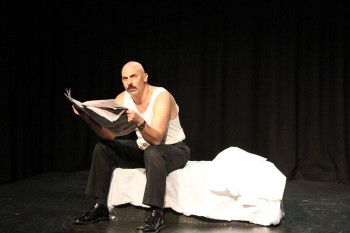The Dumb Waiter
From 2014, new company Metanoia Theatre will produce a range of artforms at the Mechanics Institute in Brunswick, including an experimental and digital theatre hub. In advance of their program of contemporary art, they present something quite different: a one-act play, The Dumb Waiter, written by Harold Pinter in 1957.

The brief program notes offer the comment “Groundbreaking in its day this classic play is sinister, absurdly funny and good-old-fashioned entertainment”. It is the last descriptor that I agree with most strongly and may be a significant determinant of your enjoyment of the piece.
Two men, the elder Ben (Greg Ulfan) and the younger Gus (Leslie Simpson), try to pass the time in a windowless, sparsely-furnished apartment while they wait for instructions. While we’re supposed to be unsure about their profession, their black suits and ties and Ben’s gruff manner quite quickly remove any uncertainty. On the promised aburdity, based on my viewing I can’t help feeling that time has made extracting humour from incongruity much more difficult than it used to be; opinions of crockery don’t get close to the eccentric events and resulting humour of an episode of The Mighty Boosh, perhaps reflecting just how mainstream absurd humour is these days.
It may be that that the absurdity here isn’t so effective at gathering laughs as it often comes across as merely a garnish on the story. Other absurdist plays, such as Beckett’s Waiting For Godot (1953), seem to have fared better with time.
Various machines, including theatre, don’t quite work if only a few features are misaligned. The dumb waiter, which is supposed to transfer objects from Ben and Gus to a mysterious room above in response to unexpected orders that drop through the ceiling, is a plastic tray pulled horizontally off stage once loaded with objects. While technically simple to implement, the tray is a curious decision given the name of the play.
However, the performances are commendable, especially the believable tension and violence between Ben and Gus (even is he was too mature in years to be young and green), when often such efforts have appeared so very fake as to be unintentionally comical.
In researching for this review, I discovered that the ending suggested by the play is something quite different to what I inferred from the production. It would be interesting to understand the thinking behind this tinkering. With this in mind, I look forward to reading more about Metanoia’s intentions in program for their 2014 season.
